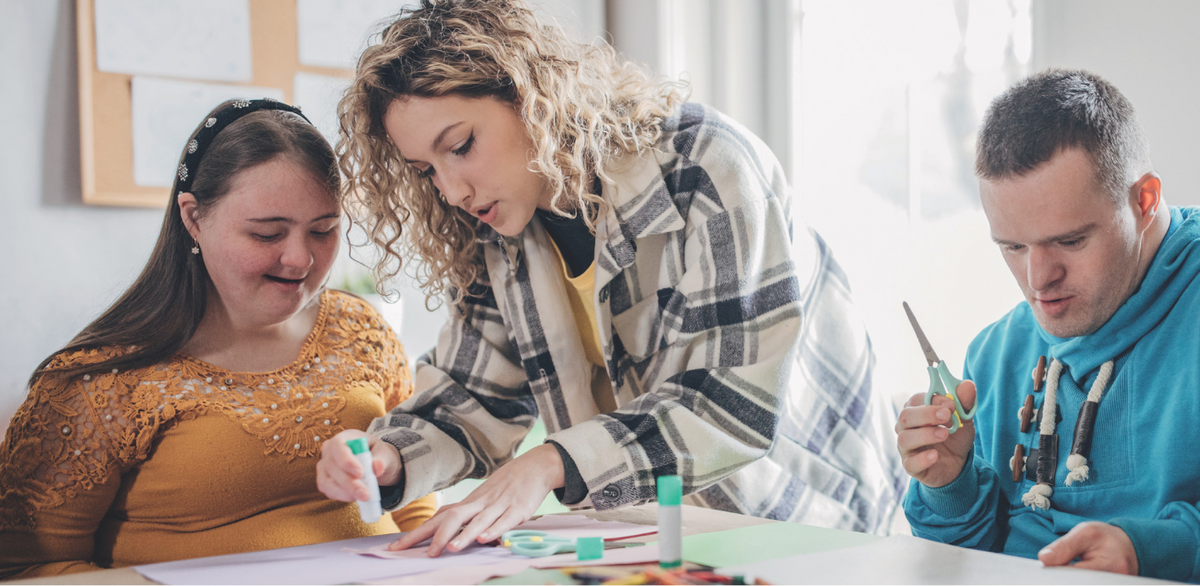Kinga Czekaj and Jennifer Thayre reflect on their efforts to promote occupational balance within an inpatient learning disability unit.
©South_agency via Getty Images
Occupational balance is one of the original concepts underlying the practice of occupational therapy. Backman (2004) states that occupational balance is ‘a relative state, recognisable by a happy or pleasant integration of life activities and demands’.
Research suggests that individuals with learning disability are ‘at higher risk of experiencing occupational deprivation, compared to the rest of the population’ (Jones, Jarvis and Stewart 2024). This may be due to dependency on others for support with engagement in activities, social isolation and learning disability service provision (DH 2001).
With occupational imbalance also being a risk for individuals who spend long periods of time within institutions, the therapy team at Avon and Wiltshire Mental Health Partnership Trust’s Daisy Unit, felt that there was a need to create opportunities and promote the improvement of occupational balance for their service users.
The therapy team supported with occupational balance on the unit by:
-
Frequently gathering service user voices to help support participation in their preferred activities, work towards identified goals and provide opportunity for them to feedback to the team.
-
Exposing service users to a variety of different activities – providing opportunities for them to try new things and expand their interests.
-
Supporting with positive risk taking – helping to empower service users and their support staff.
-
Advocating for occupational balance during multidisciplinary team meetings.
-
Educating the wider team on occupational balance and the research surrounding improving health and wellbeing.
-
Facilitation of daily group sessions – providing an opportunity for service users to engage in meaningful activities, as well as build new skills.
-
Creating weekly and daily timetables for service users and their support team to help plan dayto-day activities.
The team also supported weekend activities. With minimal therapy input on the weekends the therapy team have worked with support staff to help them deliver group sessions on the weekend.
This was done by using support workers’ strengths and OT skills in grading the activities to ensure that they are suitable for each of the service users. Resources and instructions are created, as well as the OT providing one-to-one support to support workers to ensure that they feel confident to deliver group activities on the weekend.
Feedback from service users and staff
Jennifer Thayre comments: ‘As an occupational therapy apprentice on placement within the Daisy unit, I have been inspired by the creativity of the therapy team in promoting occupational balance.’
‘The unit developed a weekly programme, with a variety of facilitated group sessions that aimed to support social ability, skill development, sensory exploration and increasing access to try new occupations.
‘These groups became a welcome addition to the day-to-day running of the unit. I was pleased to have witnessed such brilliant teamwork, all working towards a shared goal of improving quality of life for the service users.’
One service user fed back: ‘I’ve enjoyed the daily group sessions, they have helped me to learn new skills and try new activities. I have valued spending time interacting and participating in activities with staff and other service users.’
While a nurse said: ‘I’ve seen positive change on the unit through the promotion of occupational balance. Service users are now accessing a wider range of activities in the community and through the unit-based groups.
‘Staff have also benefitted from the promotion of occupational balance and are feeling more confident to positive risk-take and support with improving service users’ quality of life.’
The importance of occupational balance has been well documented, with research citing its value in promoting our sense of self, expanding our experiences, improving our health and wellbeing, proving structure to our lives.
A balance of occupations can increase our overall sense of achievement and happiness, when we are able to fulfil all the occupations we need and want to do (Yazdani et al 2018).
We feel occupational balance is an important consideration for everyone, but especially for individuals who spend long periods of time in hospital or institutions.
Backman C (2004) Occupational balance: Exploring the relationships among daily occupations and their influence on wellbeing. Canadian Journal of Occupational Therapy [online]. 71(4): 195-256.
Jones C, Jarvis K and Stewart H (2024) The lived experiences of adults with learning disabilities: taking part in a community gardening group. British Journal of Occupational Therapy [online]. 87(2): 63-124.
Department of Health (2001) Valuing people: A new strategy for learning disability for the 21st Century. London: Department of Health. Available at https://bit.ly/3BzlFLc [accessed 16 December 2024].
Yazdani F, Harb A, Rassafiani M, Nobakht L and Yazdani N (2018) Occupational therapists’ perception of the concept of occupational balance. Scandinavian Journal of Occupational Therapy [online]. 25(4): 288-297.
Words KINGA CZEKAJ, Occupational Therapist, and JENNIFER THAYRE, Occupational Therapy Apprentice, Green Lane Hospital, Avon and Wiltshire Mental Health Partnership Trust k.czekaj@nhs.net. The Daisy Unit has been closed since the writing of this article.

